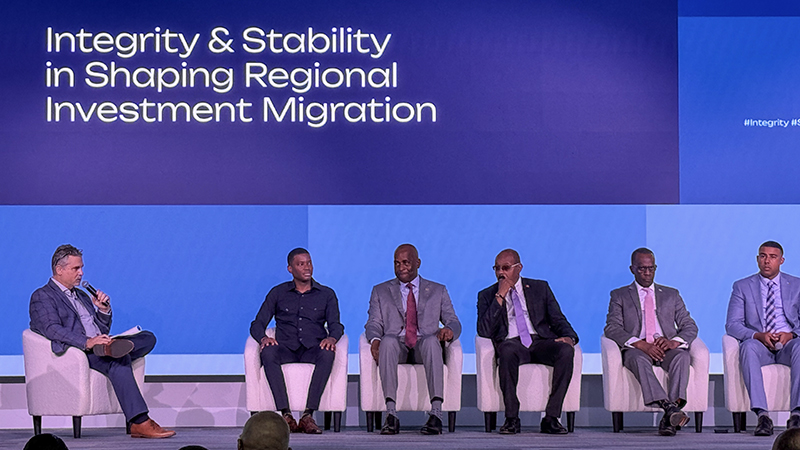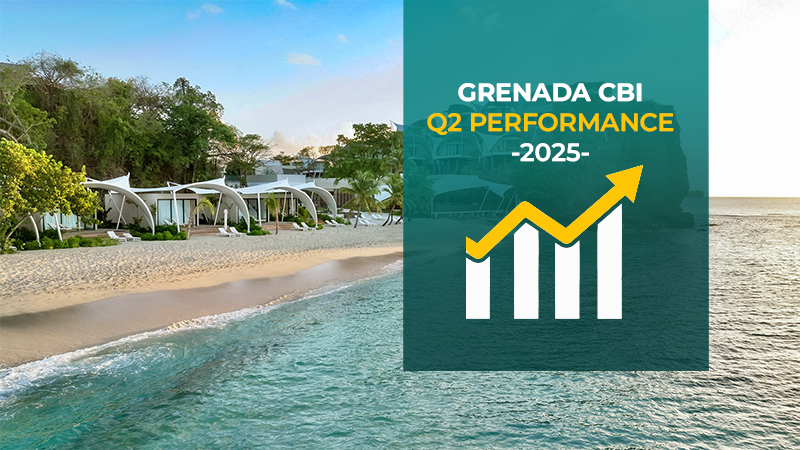Antigua – Leaders of Caribbean Citizenship by Investment (CBI) Programmes have reaffirmed their unwavering commitment to the continuation and responsible management of the region’s CBI initiatives, describing them as a lifeline for small island developing states.
Despite rising international scrutiny and the threat of Schengen visa revocation by the European Union, the heads of the five Caribbean nations offering CBI programmes have restated their dedication to upholding the principles of integrity, stability, and sustainability, while calling on stakeholders to join in advocating for the long-term viability of the industry.
“The stability of these investment migration programmes, which are purveyors of great opportunity, is quintessential to the socioeconomic stability of these countries, providing significant revenues to support much-needed economic diversification and the overall advancement of these microstates,” said Hon. Gaston Browne, Prime Minister of Antigua and Barbuda. “We are therefore duty-bound to futureproof these programmes so that they remain inherently stable, infusing even greater transformative governance mechanisms and industry best practices into their operations.”
Speaking on April 24, at the recently concluded Caribbean Investment Summit (CIS25) in Antigua, Browne joined fellow prime ministers – Hon. Dickon Mitchell from Grenada, Hon. Roosevelt Skerrit from Dominica, and Hon. Philip Pierre from Saint Lucia, as well as Attorney General Garth Wilkin from Saint Kitts & Nevis – in highlighting the transformative impact CBI has had on their countries, especially in redirecting the trajectory of national development through foreign direct investment.
Building Resilience Through CBI
Browne candidly explained that when he assumed office in 2014, Antigua and Barbuda was on the brink of bankruptcy — unable to pay for basic services like water, electricity, and fuel — with a debt-to-GDP ratio of 104%. Today, he credits the country’s CBI programme with stabilizing the economy and reducing the ratio to 64%.
“In 2014, two items of expenditure consumed our entire budget – salaries, wages and pension emoluments accounted for just over 50% of total revenues, and debt repayments, taking the aggregate spend on just two items of expenditure to over 90%. So, we had less than 10% discretionary spending,” Browne said. “It is CIP proceeds that provided the fiscal space to the extent that we were able to pursue other initiatives.”
Similarly, in Dominica, CBI revenues were instrumental in the country’s rebound following the devastation of Hurricane Maria in 2017. The government constructed 12 health centres and a hospital within two years, provided no-cost housing to communities, and replaced several fallen bridges — all funded by the programme.
Prime Minister Roosevelt Skerrit also credited the programme with finally allowing the country to commence construction of its international airport — a dream long stalled by the country’s inability to secure external financing from agencies like the Caribbean Development Bank and the World Bank.
“Following Hurricane Maria, we borrowed for housing from the World Bank in 2017. We concluded loan negotiations in October of 2017, and we were only able to access the funds, I believe, in 2023/2024 to build homes,” Skerrit admitted. “If I had to rely exclusively on the loans from the World Bank to build homes for people, many would have still been in shelters. But luckily, we had funds saved, and we were able to use that to build homes and rebuild infrastructure.”
At the time of Hurricane Maria, Dominica had saved over $260 million through its CBI programme.
Funding the Future and Managing Risk
Attorney General of Saint Kitts and Nevis, Garth Wilken, who filled in for the country’s prime minister Hon. Terrance Drew, stated that CBI revenues accounted for 60% of government revenue when the current administration took office in 2022.
“Over the last 15 years, CBI revenue has been approximately 48% of our revenue,” Wilkin said. “We’re very dependent on it.”
In response to this vulnerability, the government launched a Sustainable Island State Agenda, with a strategy to diversify the economy and fund new initiatives through the CBI programme.
“Now, what CBI funds do in Saint Kitts and Nevis is that they subsidize the cost of living,” Wilkin said. “CBI revenue goes directly to the people [and] creates an environment where persons can afford to live.”
Other countries are also creating mechanisms to buffer against external shocks and future uncertainties. In Dominica, special funds such as a Debt Repayment Fund and a Vulnerability Risk Reduction Fund have been established. The latter, housed at the Eastern Caribbean Central Bank (ECCB), receives monthly contributions to build long-term security.
In Grenada, 10% of monthly CBI revenues are deposited into a Contingency Fund, which has been mandated by law since 2022. As of February 2025, the fund had accumulated EC$54.6 million.
“The fund is just part of how CBI revenues are building financial fiscal resistance into what is the norm,” said Hon. Dickon Mitchell, Prime Minister of Grenada. “It is part of a larger strategy of building resilience in Grenada.”
Likewise, Saint Lucia’s Cabinet has approved the creation of a Sovereign Wealth Fund to support climate adaptation and sustainable development. According to Prime Minister Hon. Philip Pierre, the fund will be capitalized with CBI revenue, with a target reserve of US$300 million.
Wilkin added that Saint Kitts and Nevis is planning a similar fund with support from the International Monetary Fund (IMF), ensuring that a portion of CBI income is preserved for future development and emergency use.
Advancing CBI 2.0 and Protecting the Industry
As the region’s programmes transition into what leaders describe as “CBI 2.0”, they are urging political actors across the Caribbean to act responsibly and avoid politicizing the CBI industry.
Prime Minister Browne criticized the spread of misinformation and propaganda by domestic political opponents, warning that such rhetoric undermines regional and international confidence in CBI.
“I wish to caution our political opponents who have sought to mire our respective programmes in unjustifiable propaganda in their ill-advised attempt to destroy our programmes to create hardships for our people,” Browne said. “The misinformation and disinformation that have been pedaled about our programmes have created certain anxieties among our regional and international partners… Let those who have ears hear.”
He encouraged stakeholders and international observers to focus on the mutually beneficial outcomes of well-governed programmes. CBI, he argued, not only supports development at home, but also boosts global economies.
“Generally speaking, only wealthy people are able to raise the necessary funding to access these programmes and invariably, whenever they travel — even for vacation — in North America or Europe, they spend enormous amounts of money in those economies supporting consumption, supporting jobs,” Browne said.
“So well-governed CBI programmes are actually mutually reinforcing, and they are mutually beneficial. Hence, the need for continued cooperation and collaboration.”









